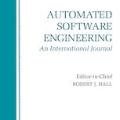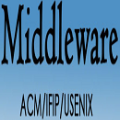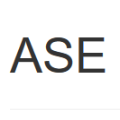CCF推荐 | 软件工程 | 国际会议信息3条
软件工程
ASE 2019
International Conference on Automated Software Engineering
摘要截稿: 2019-05-06
全文截稿: 2019-05-13
开会时间: 2019-11-11
会议难度: ★★★★★
CCF分类: A类
会议地点: San Diego, California, United States
网址:https://2019.ase-conferences.org/
The IEEE/ACM Automated Software Engineering (ASE) Conference series is the premier research forum for automated software engineering. Each year, it brings together researchers and practitioners from academia and industry to discuss foundations, techniques, and tools for automating the analysis, design, implementation, testing, and maintenance of large software systems. ASE 2019 invites high-quality contributions describing significant, original, and unpublished results.
Call for Papers
Solicited topics include, but are not limited to:
Automated reasoning techniques
Component-based service-oriented systems
Cloud computing
Computer-supported cooperative work
Configuration management
Data mining for software engineering
Domain modeling and meta-modeling
Empirical software engineering
Human-computer interaction
Knowledge acquisition and management
Mobile app development
Maintenance and evolution
Model-driven development
Program synthesis & transformations, automated defect repair
Program comprehension
Reverse engineering and re-engineering
Recommender systems for software engineering
Requirements engineering
Specification languages
Software analysis
Software architecture and design
Software product line engineering
Software visualization
Software security and trust; data privacy
Testing, verification, and validation
软件工程
Middleware 2019
ACM/IFIP/USENIX International Middleware Conference
摘要截稿: 2019-05-10
全文截稿: 2019-05-17
开会时间: 2019-12-09
会议难度: ★★★★
CCF分类: B类
会议地点: UC Davis, USA
网址:http://www.middleware-conference.org/
Original submissions of research papers on a diverse range of topics are sought, particularly those identifying new research directions. The topics of the interest for the conference include, but are not limited to:
Cloud and data centers
Virtualization, auto-scaling, provisioning, and scheduling
Data-intensive computing (big data) and data analytics
Stream Processing
Machine learning
Mobile and pervasive systems and services
Internet-of-Things, smart cities
Fog, Edge computing
Cyber-physical and Real-time systems
Energy and power-aware techniques
Event-based, publish/subscribe, and peer-to-peer solutions
Networking, network function virtualization, software-defined networking
Multimedia Systems
Fault tolerance and Consistency
Blockchains
Security and privacy
Monitoring, resource management and analysis
Middleware Design principles
Programming abstractions and paradigms for middleware
Reconfigurable, adaptable, and reflective approaches
Reviews of middleware paradigms, e.g., object models, aspect orientation, etc.
Methodologies and tools for design, implementation, verification, and evaluation
软件工程
ISSRE 2019
International Symposium on Software Reliability Engineering
摘要截稿: 2019-05-12
全文截稿: 2019-05-19
开会时间: 2019-10-28
会议难度: ★★★★
CCF分类: B类
会议地点: Berlin, Germany
网址:http://issre.net/
The annual International Symposium on Software Reliability Engineering (ISSRE) is focused on innovative techniques and tools for assessing, predicting, and improving the reliability, safety, and security of software products. ISSRE will be celebrating its 30th edition in Berlin, Germany, and will continue to emphasize scientific methods, industrial relevance, rigorous empirical validation and shared value of practical tools and experiences as paper selection criteria.
The research track at ISSRE 2019 is soliciting original, unpublished research papers in three categories: (1) full research regular (REG) papers, (2) practical experience reports (PER), and (3) tools and artifact (TAR) papers. Papers will be assessed with criteria appropriate to each category. ISSRE looks for original research exploring new scientific ideas, contributing new evidence to established research directions, or reflecting on practical experience.
Authors of the best REG papers accepted and presented at ISSRE will be encouraged to submit an extended version of their papers to a special section of the Information and Software Technology journal.
REG papers should describe a novel contribution to reliability of software systems. Extensions of reliability research into adaptive AI systems, blockchains and large sensor infrastructures are particularly welcome. Regardless of the domain, novelty should be argued via concrete evidence and appropriate positioning within the state of the art. REG papers are also expected to clearly explain validation process and its limitations.
PER are expected to provide an in-depth exposition of practical experiences and empirical studies collected through the application of known research tools and methods related to ISSRE topics. PER need to identify and discuss relevant lessons learned. The goal of PER is to offer evidence of reduced risk for future tech transition of the same or similar technology. ISSRE strongly encourages PERs that combine the efforts of researchers and industry practitioners.
TAR papers should describe a new tool or artifact. Tool-focused TAR papers must present either a new tool, a new tool component, or novel extensions to an existing tool. Tool-focused TAR papers should include a description of: 1) the theoretical foundations, 2) the design and implementation concerns, such as software architecture and core data structures, 3) experience with realistic case studies and observed advantages over similar tools. Making the tool publicly available is strongly encouraged to allow continued evaluation process. Artifact-focused TAR papers should cover 1) a working copy of a software and 2) experimental data sets.
Topics of interest include development, analysis methods and models throughout the software development lifecycle, and are not limited to:
Primary dependability attributes (i.e., security, safety, maintainability) impacting software reliability
Secondary dependability attributes (i.e., survivability, resilience, robustness) impacting software reliability
Reliability threats, i.e. faults (defects, bugs, etc.), errors, failures
Reliability means (fault prevention, fault removal, fault tolerance, fault forecasting)
Metrics, measurements and threat estimation for reliability prediction and the interplay with safety/security
Reliability of software services
Reliability of open source software
Reliability of Software as a Service (SaaS)
Reliability of software dealing with Big Data
Reliability of model-based and auto-generated software
Reliability of software within specific types of systems (e.g., autonomous and adaptive, green and sustainable, mobile systems)
Reliability of software within specific technological spaces (e.g., Internet of Things, Cloud, Semantic Web/Web 3.0, Virtualization, Blockchain)
Normative/regulatory/ethical spaces pertaining to software reliability
Societal aspects of software reliability
Anonymizing Rules
下载Call4Papers App,获取更多详细内容!


登录查看更多
相关内容
本杂志详细地介绍了自动化软件工程技术的基础、技术、工具和应用中的重要工业经验的研究、指导论文、调查和账目。这包括研究构建、理解、调整和建模软件工件和过程的技术。
自动化软件工程的覆盖范围检查自动化系统和协作系统以及人类软件工程活动的计算模型。此外,它提出了适用于自动化软件工程的知识表示和人工智能技术,以及支持或提供理论基础的形式化技术。该杂志还包括对书籍、软件、会议和研讨会的评论。
官网地址:
http://dblp.uni-trier.de/db/journals/ase/
Arxiv
78+阅读 · 2019年11月10日





